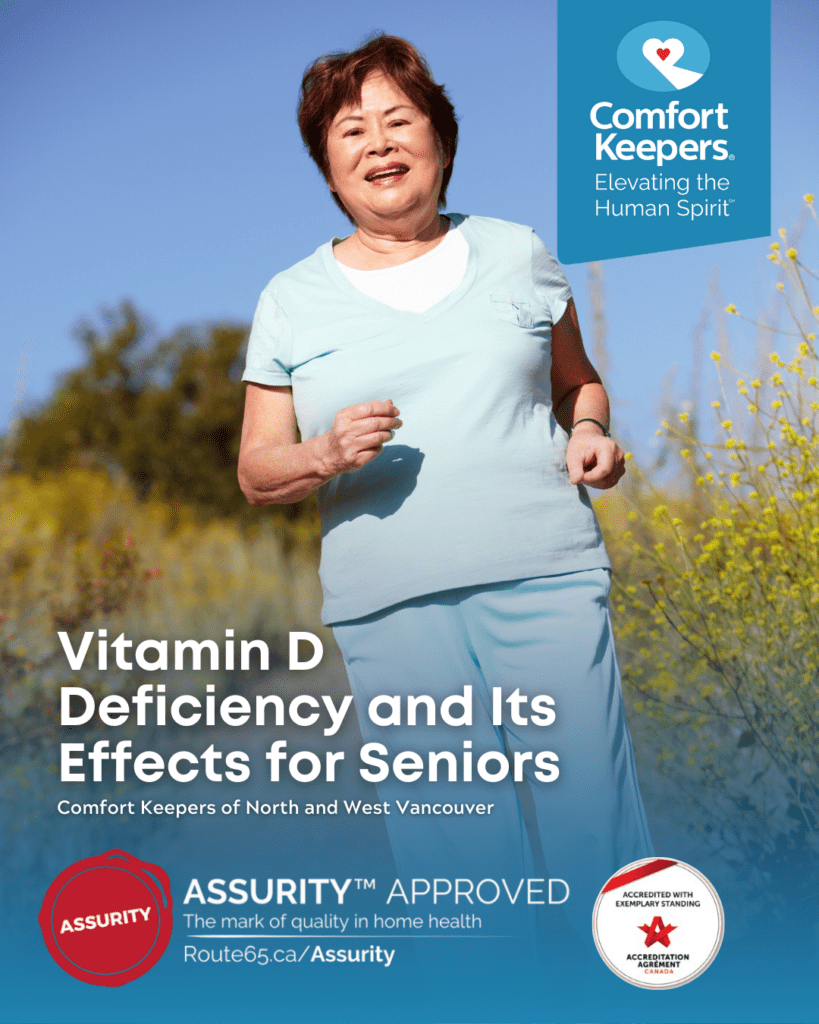Vitamin D Deficiency and Its Effects for Seniors
Wellness | January 19, 2024

Vitamin D Deficiency and its Effects
Vitamin D Deficiency and its Effects – Aging brings about symptoms one may never have experienced in his or her younger years: fatigue, general muscle pain and weakness, joint pain, poor concentration, restless sleep – the list goes on. These symptoms may be the result of normal wear and tear on the body over the years. They are also symptoms of vitamin D deficiency, a potentially serious condition that has gotten more attention over the years, especially in the senior population. It is estimated that more than 40% of seniors do not have enough vitamin D in their systems.
DID YOU KNOW?
It is estimated that more than 40% of seniors do not have enough vitamin D in their systems.
Vitamin D is more than sunlight
Vitamin D was once believed to only help strengthen bones and teeth. However, recent advances in science show that vitamin D plays an important role in the proper functioning of the body and can help prevent many diseases and conditions. Vitamin D is found in small amounts of food, such as fatty fish and fortified dairy products, juices and cereals. However, 80-90 percent of vitamin D is obtained by exposure to sunlight.
Researchers have found several factors that put seniors at greater risk for vitamin D deficiency than other age groups. Seniors who are either unable or do not otherwise leave their homes do not receive the benefits of the sun’s rays. Active seniors must bear in mind the changes in the skin due to aging decrease the skin’s ability to synthesize sunlight into vitamin D. Also, kidney function decreases with age, which inhibits the body’s ability to properly process the vitamin.
Vitamin D deficiencies can be dangerous
Studies have found that vitamin D deficiency may contribute to osteoporosis, muscle weakness, hip fractures, diabetes, cancer, heart disease, arthritis and poor general health. The New England Journal of Medicine recently studied vitamin D and how it prevents fractures in seniors. While the recommended dosage of vitamin D varies from person to person, the study showed that it takes a daily dose of at least 800 international units (IU) of vitamin D to consistently prevent broken bones. This dosage reduced the risk of hip fractures by 30 percent and other breaks by 14 percent. The study also demonstrated that too much calcium, more than 1,000 mg per day, may dilute vitamin D’s benefits to bones.
The symptoms of vitamin D deficiency are often subtle and a doctor should always be consulted before treatment is considered.
Related Article: How Seniors Can Enhance Mental Health
A list of Vitamin D deficiency and symptoms that seniors may experience:
- Fatigue
- General muscle pain and weakness
- Muscle cramps
- Joint pain
- Chronic pain
- Weight gain
- High blood pressure
- Restless sleep
- Poor concentration
- Headaches
- Bladder problems
- Constipation or diarrhea
Those caring for seniors who notice these symptoms should advise a trip to the doctor.
The following tips can help seniors increase their Vitamin D intake.
- Researchers suggest 10 minutes of uncovered sun exposure three times a week, without the use of sunscreen.
- Supplements, such as a multivitamin, may help if approved by a physician.
- Help the senior in your life choose foods that are high in vitamin D such as cod liver oil, salmon, mackerel, tuna, beef liver, cheese, and egg yolks.
- Help the senior find foods fortified with vitamin D. These foods include milk, breakfast cereals, and juice drinks. While the daily diet may not provide the daily amount of vitamin D required, studies show that these foods can increase vitamin D levels in the body.
Always ensure the senior you care for consults a health care provider before considering any of these suggestions
The Best Senior Home Assistance Care in North and West Vancouver is Comfort Keepers®
Our senior home care agency offers in-home care focusing on aging in place. Our services include dementia care, end-of-life care, post-surgery care, and palliative care. Comfort Keepers can assist seniors with living transition services, personal care, companionship care, and more!
Quality and Accredited Elderly Care: Happier, Healthier, and at Home with 24/7 Senior Care Opportunities!
Do you need a home care solution for yourself or a loved one? Have you been thinking about retirement homes and their alternatives as a solution? Comfort Keepers® enables seniors to maintain happy, healthy lives in the comfort of their own homes. In-home care services are available in North Vancouver, West Vancouver, and the surrounding areas.
Comfort Keepers® is a Senior Care Agency That Can Make a Difference with Interactive Caregiving™
Our in-home caregivers ensure our senior clients have the best quality of life. The Interactive Caregiving™ program ensures that a senior’s safety, nutrition, mental well-being, and everyday needs are met. This program brings joy and good health to each client’s home.
Comfort Keepers® North Vancouver and West Vancouver Can Help with In-Home Elderly Care Services!
If you are concerned about the health and well-being of a loved one we can help! Comfort Keepers offers 24-hour care and delivers top-quality and compassionate care for seniors. We are dedicated to safety technology solutions that foster independence and enhance well-being.
Locally Owned and Operated Home Health Care Agency
Our care centers around companionship for seniors. Empathetic care originates from the soul and allows us to meet our client’s requirements. The seasoned in-home caregivers employed by Comfort Keepers are carefully chosen based on their empathetic qualities.
Contact the Comfort Keepers® North Vancouver and West Vancouver office at (604) 998-8806 to learn more about our unique in-home care solutions for seniors.
Comfort Keepers is an Accredited Senior Care Agency in North and West Vancouver, BC
Accreditation is a rigorous process that involves industry experts evaluating an organization’s processes, policies, and procedures. Comfort Keepers® North and West Vancouver has been awarded Exemplary Standing by Accreditation Canada. This achievement recognizes that Comfort Keepers® meets or exceeds the stringent quality standards for Home Care companies established by Accreditation Canada.
References:
Age and Aging (2008). Vitamin d deficiency: can old age learn from childhood? Retrieved on December 28, 2012 from http://ageing.oxfordjournals.org/content/37/1/6.full.pdf+html
Emery, Gene (2012). High-dose vitamin d prevents fractures in elderly. Retrieved on December 28, 2012 fromhttp://www.reuters.com/article/2012/07/05/
us-vitamind-idUSBRE86414220120705.
Mosekilde, Leif. Medscape (2005). Vitamin d and the elderly. Retrieved on December 28, 2012 from http://www.medscape.com/viewarticle/500874.
Holick, M.D., PhD, Michael F. The New England Journal of Medicine (2007). Vitamin d deficiency. Retrieved December 28, 2012 from http://www.nejm.org/na102/home/
ACS/publisher/mms/journals/content/nejm/2007/nejm_2007.357.issue-3/nejmra070553/production/nejmra070553.fp.png_v03
WebMD.com. Vitamin d. Retrieved on December 28, 2012 from http://www.webmd.com/vitamins-supplements/ingredientmono-929-vitamin+d.aspx?activeIngredientId=929&activeIngredientName=vitamin+d&source=1.
VitaminDCouncil.org (2012). Vitamin d deficiency: a global epidemic. Retrieved on December 28, 2012 from http://www.vitamindcouncil.org/about-vitamin-d/vitamin-d-deficiency/.
MayoClinic.com. Vitamin d. Retrieved on December 28, 2012 from http://www.mayoclinic.com/health/vitamin-d/NS_patient-vitamind
Jegtvig, Shereen. About.com (2012). Nutrient deficiency: vitamin d. Retrieved on December 28, 2012 from http://nutrition.about.com/od/therapeuticnutrition1/a/Vitamin-D-Deficiency.htm
Vitamin D Council. Vitamin d toxicity. Retrieved on December 29, 2012 from http://www.vitamindcouncil.org/about-vitamin-d/what-is-vitamin-d/vitamin-d-toxicity/
American Journal of Physical Medicine and Rehabilitation. Vitamin d deficiency, implications in the rehabilitation setting. Retrieved on December 29, 2012
Individualized Home Care Options
Long-Term Home Care, 24 Hour Home Care & Short Term Care Options Customized for You





